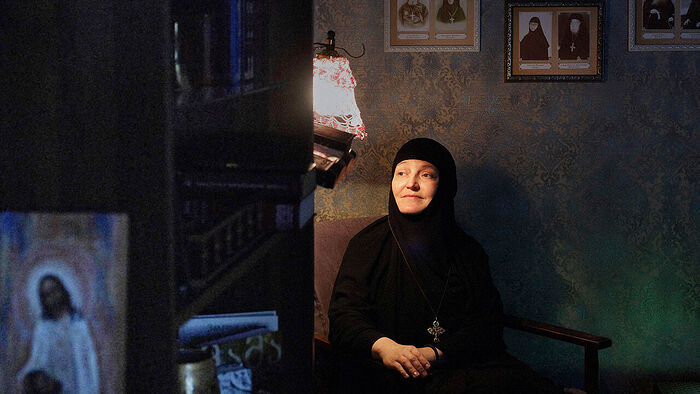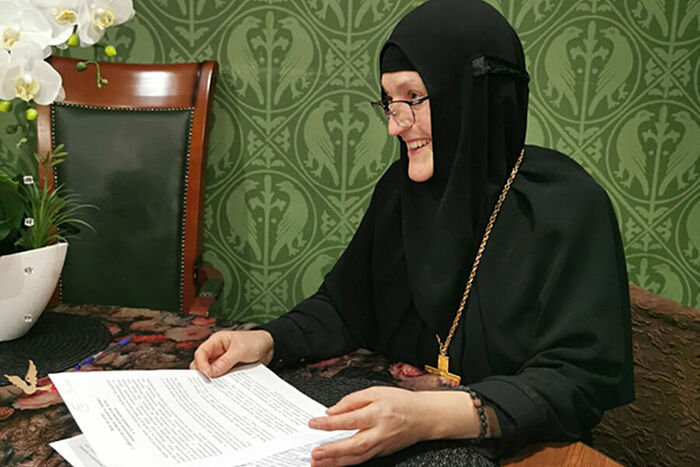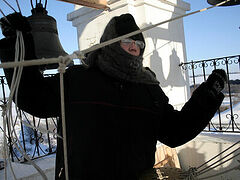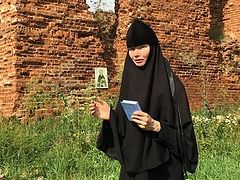According to Mother Xenia, abbess of the Iveron Convent in Orsk, her encounter with her spiritual father, Archpriest Sergei Baranov, was the final chord in her secular life. In this second part of the interview, the abbess talks about her path and how the monastery is being built today.
—I called Fr. Sergei almost every single day. I shared my worries and told him about how prayer was going for me.
Having become Batiushka’s spiritual child, I tried to live in complete obedience. With his blessing, I read the spiritual books, The Words and Life of Elder Porphyrios of Kavsokalivia, Abbess Arsenia, My Life With Elder Joseph, the books of Elder Sophrony (Sakharov), We Shall See Him As He Is, On Prayer, and others. I became more and more convinced that the monastery is the perfect form of human life with God on earth.
Speaking with Batiushka, reading books, praying the Jesus Prayer, I realized that I didn’t want another life, and becoming a nun was only a matter of time. People have different fates: Sometimes a switch suddenly flips for someone, but for me everything happened gradually; it ripened over a long time. Meeting Batiushka was the final chord.
Once, standing before an icon of St. Seraphim of Sarov, I mentally asked him: “How should I live; what’s my path?” And I heard a quiet reply: “Help Batiushka build the monastery.” No voice, no vision, just a calm and clear thought that resonated within.
A little earlier, while preparing to work on Fr. Sergei’s documentary called Xenia, I went to St. Petersburg to pray to St. Xenia. And there, at the chapel, I asked her: “Xenyushka, if it’s God’s will and there’s no pride and vainglory in it, help me become a nun.”
According to Mother Xenia, the decision to follow Fr. Sergei to Orsk was already ripe when she was suddenly asked to vacate her apartment in Moscow… Three months after her trip to St. Petersburg to visit St. Xenia, Fr. Sergei returned from Mt. Athos, and Mother flew with him to Orsk. For good. Batiushka blessed her to buy a one-way ticket.
—On May 6, 2013, on the feast of St. George the Victorious and the Iveron Icon of the Mother of God, on the site where the monastery would be built, a memorial stone was laid and a cross was erected, which is now located in the alter of the lower church named for St. Seraphim of Sarov. I was tonsured on July 7, on the feast of the Nativity of St. John the Baptist.
The construction of our monastery in the city of Orsk began gradually, not far from the village of Kherson, where our sisterhood was born. In this village, an ordinary man, Anatoly Merzlyakov, wanted to revive the place where his ancestors had lived, return to the land of his ancestors, and raise a farm: He planted fields, raised cattle, and built a church. He allocated a house where, since 2008, two women had been living, who cleaned the church and took care of the garden. They’re schemanuns now.
Starting in April 2013, while the monastery complex was being built, we lived in the old church. We made partitions, making small cells. At that time, Batiushka was also dealing with the construction of the main cathedral in the city—he was its rector and was building the monastery at the same time.
Fr. Sergei founded our monastery, and he supports it today. Batiushka is the captain of our ship, and I try to help as much as I can.
—Batiushka is a unique, rare person, able to combine greatness and simplicity. This was my impression after my first meeting with Fr. Sergei: He’s like a giant with his feet firmly planted on the ground and his head reaching the sky in his spiritual search and thinking. I think this is a Divine property, because God, in His greatness, is very simple.
To our shame, all of us, his spiritual children, often grieve our father. I say this sincerely, so as not to give the impression that everything is always perfect and smooth. There are difficulties and temptations, tests of loyalty. But we try, we climb…
In the world, they think that people leave for a monastery out of grief or unrequited love. However, a true monastic doesn’t leave, but rather arrives. Mother Xenia always emphasizes this when new sisters come to the monastery.
—The monastery is a serious choice. Making such a decision shouldn’t be emotional. We don’t “leave” for the monastery but “come.” We come to serve God, to meet our Bridegroom, to prepare for this meeting.
When someone goes to a monastery like a refuge—to hide from problems or from his restlessness and unfitness for the world—it can cause trouble. The monastic’s goal is Jesus Christ, the desire to meet Him and love Him, to unite with Him and love the whole world in Him. It’s also a willingness to die for Him every day. Therefore, when new sisters come to us, our main task is to understand their disposition and give them time. Time should show and reveal their true goal, why they came to the monastery. There’s only one criterion—love for the person of Jesus Christ and selflessness. Because love was, is, and will be synonymous with sacrifice and self-denial. Love’s not a feeling, but an action. Batiushka always talks about this in his homilies and books.
Monastic asceticism is the path of constant self-denial, moving away from yourself and towards God through various situations, through prayer.
For example, this happens when we prayerfully renounce ourselves, our imaginative thinking, feelings, thoughts, and we create a space for pure prayer so God Himself might find a place for Himself and pray in our heart. We try to renounce ourselves in fulfillment of obediences, in our relationships with each other. We push ourselves away and move towards God.
In one Russian publication, the Iveron Convent is called a “heartfelt monastery, where people can visit in jeans and where they smile at everyone they meet.”
—How do you manage to find the necessary balance between openness, love, and discipline?
—We don’t do anything on purpose; we try to live naturally and treat people with understanding, remembering that we also went through our period of jeans and not understanding what kind of place this is.
The same word can work for love or it can alienate. In our monastery, we have a list of rules in the form of requests, not prohibitions. In any case, all the sisters try to avoid being categorical.
 One of the works of the iconography workshop at the Iveron Convent
One of the works of the iconography workshop at the Iveron Convent
The most important thing is to show love for people. There should be discipline, but without love, it only impoverishes.
This is the foundation for the sisters’ relations with each other. Batiushka always emphasizes that our relationships are the most important thing. When there is trust, humanity, and warmth, then all issues are easily resolved.
And of course, the monastic life is impossible without obedience. Batiushka is now like the father of a large family; we resolve all issues through him. And we try to communicate with each other like children: I can make a remark to the sisters, but with love and the understanding that I myself am still like a child on the path of development. Ten years of monasticism—that’s only the start of a long road. For now, we’re all still like little children, and glory to God that we have a father raising us.
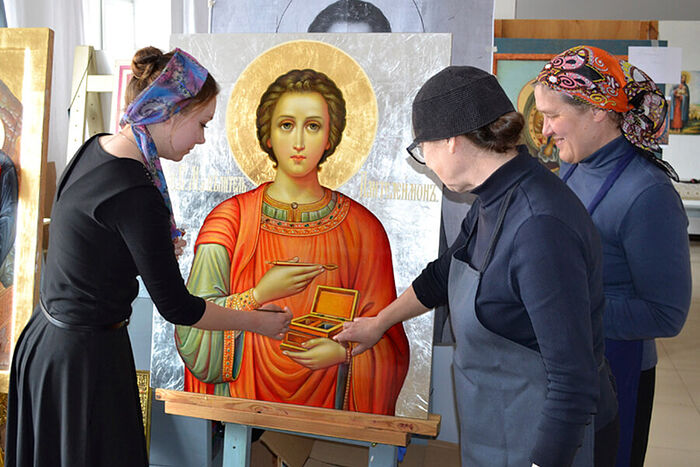 One of the works of the iconography workshop at the Iveron Convent
One of the works of the iconography workshop at the Iveron Convent
Many consider the appearance of the Iveron Convent in the steppes of the Orenburg region, on the outskirts of the city of Orsk, to be a miracle. A year after the consecration of the first stone, a large structure appeared on the former wasteland and the first Liturgy was celebrated. Today, there are many churches in the monastery, the biggest of which is the Church of the Iveron Icon of the Mother of God. The rest are dedicated to saints who are spiritual guides for Fr. Sergei and the sisters of the Iveron Monastery: Sts. Mary of Egypt, Sergius of Radonezh, Seraphim of Sarov, Symeon the New Theologian, Gabriel (Urgebadze), Nicholas the Wonderworker, and John of Shanghai and San Francisco. Different parts of the monastery also have architectural accents reminiscent of beloved holy places: A cross was erected as a symbol of Golgotha, where Christ was crucified. A man-made Mt. Athos was created, with a metal cross standing on it—an exact copy of the one installed on the peak of Mt. Athos in 1882. And the monastery has a “joy bench.”
—There’s a bench by the Church of St. Mary of Egypt over which Batiushka hung some old Christmas tree ornaments, hoping it would make human hearts more tender. Because it’s precisely tender emotion that makes our hearts soft, and only a soft heart can experience the subtle spiritual world.
I once read that the conceptual root of “tenderness” [umilenie] is “to prick” [ukalivat]. I talk about this on excursions as I lead people up to the bench. When people come to the monastery with serious problems—incurable diseases, difficult family situations—it’s hard to give advice; you can only deeply empathize and sympathize. Then we sit on this “joy bench” together, and I suggest that they look up at the Christmas tree ornaments. And so we sit with our problems, and there, over our heads—is childhood. Why was everything so good in childhood? Because it’s a time when you’re not completely, one-hundred percent responsible for your own fate—your parents are responsible for you.
And if father and mother didn’t instill the knowledge that there are a Father and Mother above them, then in adulthood the children remain orphans. But modern society persistently imposes the idea that you’re the master of your own fate and can make of yourself what you will. So there are egotistical grown-ups, with no one over them… If something goes right, they say it’s all due to their own merit; if something goes wrong, they fall into depression or blame others. How many generations of such orphans have we raised! But if the mother and father imparted the knowledge that there are the Lord and the Theotokos, then in any situation, the child will know and sense that he is not alone, and will turn to his Heavenly Parents: “Lord, have mercy;” “Most Holy Theotokos, don’t abandon me;” “Thank you, Lord;” “Forgive me, Lord. It didn’t work out this time, but I’ll keep trying…” This gives a sense of evenness and protection.
And that’s how we reflect together on our “joy bench,” when you suddenly notice the person smiling…
For me personally, joy is those moments of meeting God, when you feel like an unworthy sinner, but the Lord covers you with grace, inspires you to work spiritually, and gives you the opportunity to change yourself. You weep from both shame and tender emotion, knowing with your heart that He loves even someone like you, and that you’re now very close to Him.
Our goal is to unite with God. And on the path to this goal, we are consoled with the opportunity to touch such a state, when you’re with God and God is in you. That’s when true unity comes—the unity of the world, of people in God, the personhood of God. And you’re in it. This is happiness and joy.
Rejoice that God is in everything and everywhere. Everything is permeated with Him, this thread of the Holy Spirit. All circumstances, events, people, feelings, and experiences are strung like beads on this thread. Usually, we’re distracted by these beads, and we lose that main, continuous thread. But if we would always live it, feel it, then we would always rejoice. This is what the Apostle Paul calls us to when he says: Rejoice evermore. Pray without ceasing. In every thing give thanks: for this is the will of God in Christ Jesus concerning you (1 Thess. 5:16-18). The Apostle Paul gives us a high benchmark to strive for, but it’s possible only in God and with God—there’s no other way.

